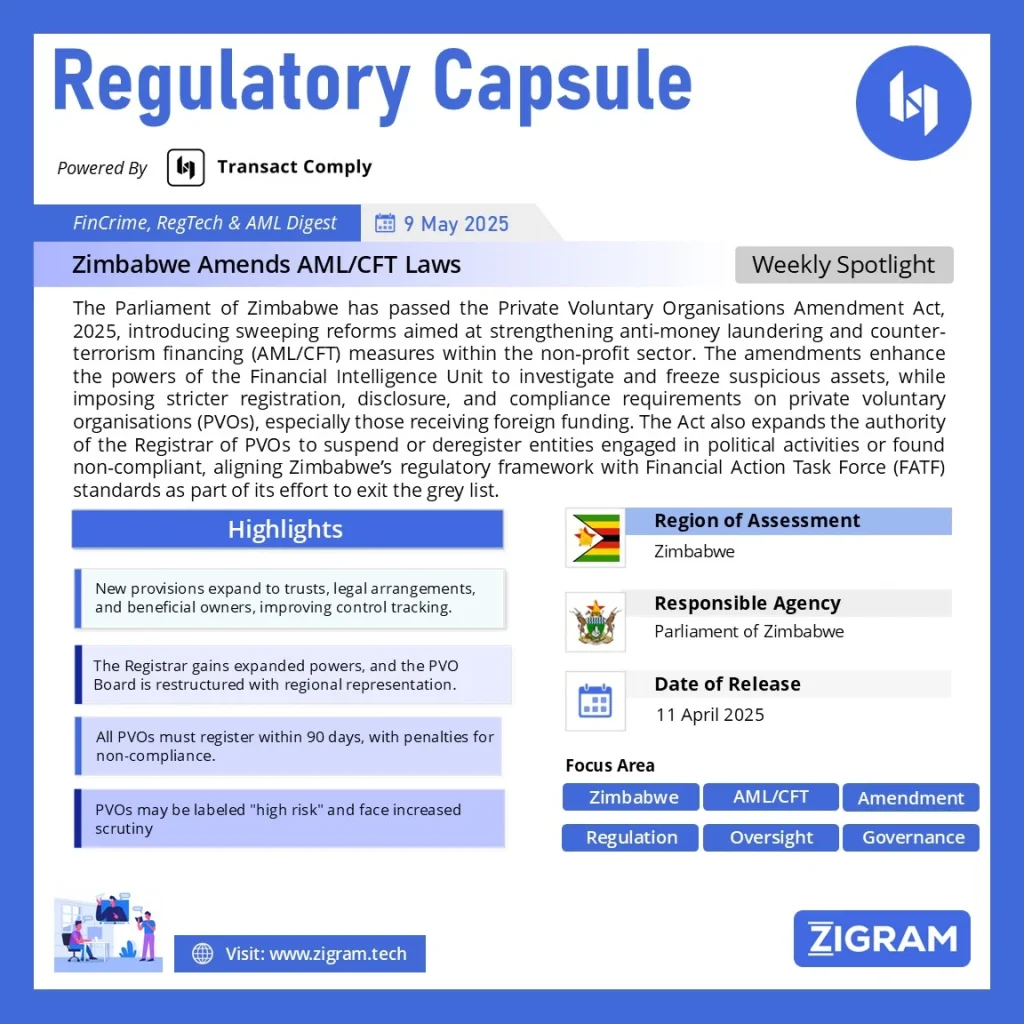Regulation Name: Private Voluntary Organisations Amendment Act, 2025
Date Of Release: 11 April 2025
Region: Zimbabwe
Agency: Zimbabwe Parliament
The Private Voluntary Organisations Amendment Act, 2025: A Game Changer for Zimbabwe’s Non-Governmental Sector
On April 11, 2025, the Government of Zimbabwe enacted the Private Voluntary Organisations Amendment Act, 2025, marking a significant overhaul of the regulatory framework governing private voluntary organisations (PVOs) in the country. This new legislation introduces a range of measures to tighten oversight, enhance transparency, and align Zimbabwe’s laws with international standards, particularly in the fight against money laundering and terrorism financing.
The Amendment Act introduces important changes that affect not only the operations of registered PVOs but also those of unregistered trusts operating as PVOs. These changes reflect Zimbabwe’s commitment to strengthening anti-money laundering (AML) and counter-terrorism financing (CFT) mechanisms while also curbing the political involvement of PVOs.
Key Features of the Private Voluntary Organisations Amendment Act, 2025
1. Expanded Definitions and Regulatory Oversight
The amendment expands the scope of PVOs to include trusts, legal persons, and “beneficial owners,” introducing greater scrutiny of organisations and individuals who control or influence PVOs. The Registrar of PVOs now has more extensive powers, including registering, cancelling, and regulating organisations.
A crucial addition is the definition of “beneficial owner,” which includes those with significant control over an organisation, whether directly or indirectly. This ensures greater accountability and transparency in the management of PVOs.
2. Revamped PVO Board Structure
The amendment revamps the composition of the PVO Board, increasing the number of members from five to eight. The Minister has more control over appointments, and the Registrar now has a more central role in approving or rejecting registrations, further streamlining the registration process.
3. Strict Registration and Reporting Requirements
All operating PVOs, including pre-existing charities, must register within 90 days from the commencement of the Act or within 30 days of starting operations. Non-compliance will result in severe penalties, including fines and imprisonment.
Furthermore, organisations must report any material changes in operations, ownership, or governance structure. Failure to comply with these reporting requirements will incur daily fines.
4. Prohibition on Political Involvement
The Act prohibits PVOs from engaging in political activities, including supporting or opposing political parties or candidates. PVOs found guilty of political involvement will face criminal penalties, including fines and imprisonment for office-bearers. However, providing assistance to disadvantaged individuals to help them become election candidates is permissible, provided it remains non-partisan.
5. Civil Penalties and Risk Assessments
The introduction of civil penalty orders enables the Registrar to impose fines for non-compliance with the Act’s provisions. This includes penalties for receiving donations from illegitimate sources or failing to report changes in ownership. The Registrar may also designate certain PVOs as “high risk” and impose additional compliance obligations, such as detailed disclosures of beneficial ownership.
6. New Measures Against Proliferation Financing
The amendment also extends the scope of Zimbabwe’s anti-money laundering laws to include provisions addressing the financing of weapons of mass destruction (WMD). The Money Laundering and Proceeds of Crime Act [Chapter 9:24] is now amended to address proliferation financing alongside money laundering and terrorist financing, marking a major step in Zimbabwe’s commitment to international security standards.
7. Appeals and Dispute Resolution
The amendment provides a new process for appealing decisions made by the Minister regarding PVO registrations or penalties. This includes a 14-day period to appeal to the Administrative Court, ensuring a fair and transparent process for all stakeholders.
The Path Ahead for Zimbabwe’s Non-Governmental Organisations
The Private Voluntary Organisations Amendment Act, 2025 represents a significant shift in the regulatory environment for PVOs in Zimbabwe. It introduces stricter compliance requirements, greater government control, and increased accountability for both local and international organisations operating in the country.
As the amendment aims to curb the misuse of PVOs for political purposes and enhance transparency in the sector, it is crucial for all organisations—especially those incorporated before the Act’s enactment—to review their operations, governance structures, and reporting practices. Non-compliance could result in heavy penalties, including fines, suspension, or even imprisonment for office-bearers.
With the expansion of AML and CFT measures, PVOs must now be more vigilant in ensuring that their operations and funding sources comply with international standards. This move underscores Zimbabwe’s commitment to aligning its regulatory framework with global best practices and tackling illicit financial flows.
Conclusion
The enactment of the Private Voluntary Organisations Amendment Act, 2025 is a landmark development in Zimbabwe’s regulatory landscape. As the country continues to adapt its legal frameworks to meet international standards, all stakeholders in the non-governmental sector need to stay informed and compliant with these new provisions.
Read the full amendment here.
Read about the product: Transact Comply
Empower your organization with ZIGRAM’s integrated RegTech solutions – Book a Demo
- #Zimbabwe
- #NGO
- #Regulations
- #PrivateVoluntaryOrganisations
- #PVO
- #AML
- #CFT
- #AntiTerrorism
- #MoneyLaundering
- #ProliferationFinancing
- #NGOCompliance
- #ZimbabweRegulations
- #AMLCompliance
- #TerroristFinancing
- #NGOOperations
- #LegalReform

